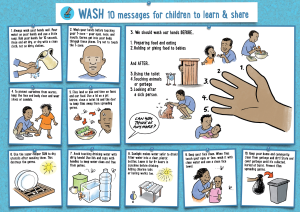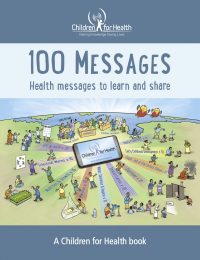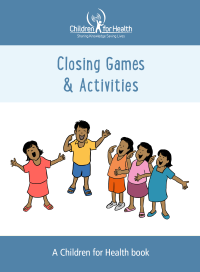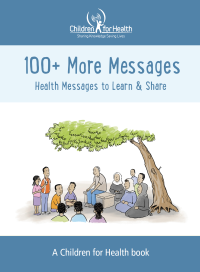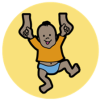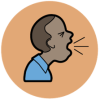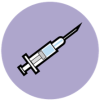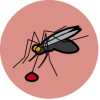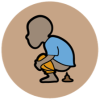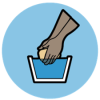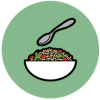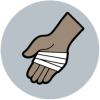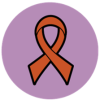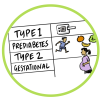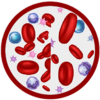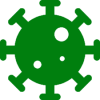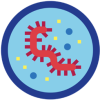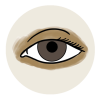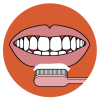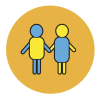Water, Sanitation & Hygiene

More than half of all illnesses and death among young children is caused by germs that get into the body through the food they eat and the water they drink.
Older children can be involved in promoting and practising healthy habits that work in their own family and community. The correct use of toilets, safe drinking water and safe refuse disposal help prevent the spread of germs.
Use the message tabs on the left to read our Top Ten Messages on Water, Sanitation and Hygiene for children to learn and share. Scroll down to see ideas on what children can do to understand, find out more, take action and reflect on this topic.
Use the links below to browse our FREE resources to help children learn more, share their knowledge and become agents of change.
10 Messages on
Water, Sanitation & Hygiene
- Always wash your hands well. Pour water on your hands and use a little soap. Rub your hands for 10 seconds, rinse and air dry, or dry with a clean cloth, not on dirty clothes.
- Wash your hands before touching your T-zone – your eyes, nose, and mouth. Germs get into your body through these places. Try not to touch the T-zone.
- We should wash our hands BEFORE 1. preparing and eating food; 2. holding or giving food to babies. And AFTER 3. using the toilet; 4. touching animals or garbage; 5. looking after a sick person.
- To protect ourselves from worms, keep the face and body clean and wear shoes or sandals.
- Flies land on poo and then on daces and our food. Use a lid on a pit latrine, close a toilet lid and the door to keep flies away from spreading germs.
- Use the super-helper SUN to dry utensils after washing them. This destroys the germs.
- Avoid touching drinking water with dirty hands! Use lids and cups with handles to keep water clean and free from germs.
- Sunlight makes water safer to drink! Filter water into clear, plastic bottles. Leave it for 6+ hours in sunshine before drinking. Adding chlorine tabs or boiling works too.
- Keep your face clean. When flies touch your eyes or face, wash it with clean water and use a clean face towel.
- Keep our home and community clean from garbage and dirt! Store and cover garbage until it’s collected, buried or burnt. Prevent flies spreading germs.
Children can learn, collect & share these messages!
While teaching these messages, encourage children to…
MAKE their own Water, Sanitation & Hygiene Messages using their own words in their own language!
LEARN these messages so they never forget them!
ADD these messages to their collection!
SHARE these messages with other children and their families!
If your class or group is struggling to stay connected and engaged, we have loads of ideas for ideas to help them! Have a look at Closing Games & Activities.
Use the questions/discussion topics below to help children to memorise the messages and really understand them.
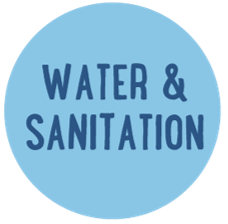
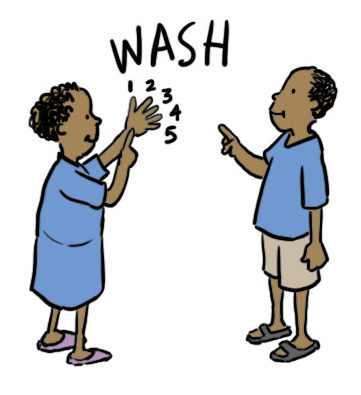
What can children make?
WORK together to make a Tippy Tap!
MAKE a wash mitt to hold soap for washing their bodies.
MAKE the toilet a good place to have a pee and a poo.
MAKE a fly trap out of a plastic bottle and some sugar water or poo!
CREATE a song about sunshine making water safer.
HELP make clean water to drink at home using sunlight.
MAKE a sand filter to clean dirty water.
MAKE a map of water supplies in their community and whether it is safe to drink or not.
BUILD a drying rack for cooking pots and plates so they can dry in the sun.
MAKE a play about where germs like to hide.
What can children do?
LEARN a song to help them wash their hands properly.
ACT out a play to show what happens to the ‘germ family’ when the ‘clean family’ move into their village.
HELP their younger siblings to make sure they know how to wash their hands.
SPEND an hour observing a group of people; watch and record how often they touch their faces, clothes and other people.
THINK of all the ways that germs can spread from hands.
WORK together to make the school toilets clean.
LEARN how to clean water using a filter.
CLEAR the yard of poo and rubbish, then wash their hands.
START a hygiene club at school and improve their hygiene.
MAKE sure there is always plenty of firewood or fuel at home to boil water for drinking.
CLEAN up their school yard and keep it free from rubbish and dirt.
SHARE what they know about flies, dirt and germs with their families.
KEEP their water container clean and covered and always use a scoop, never their cup or hands. Show their younger siblings how to safely take water from the pot.
What can children ask?
HOW do they keep their hands clean and free from germs?
DO they have soap to use for washing hands at home?
HOW much does soap cost at the local shop?
HOW do they keep their bodies clean?
HOW should they brush their teeth?
WHERE do germs come from? Where do they live? How do they spread?
HOW do flies live, eat and breed?
HOW do flies carry dirt on their legs?
WHAT are the local water sources?
HOW can they make dirty water safe to drink?
WHERE can they get plastic bottles?
WHAT cloths can be used as a water filter?
WHAT hygiene practises do family members use when they prepare food?
WHERE are the places in the house that might have the most germs?
Download these free materials now to help children learn and share these
essential health messages. See our free resource section for more!

